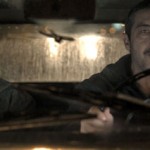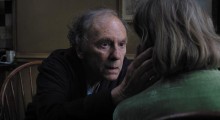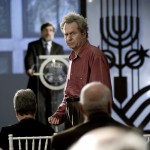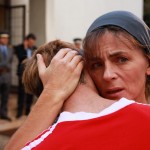Authors — Howard Feinstein
-
JUAN IS THE LONELIEST NUMBER: LATINBEAT AT FSLC

Solitude: It can come from choice, or by default. An unusual number of movies made across South and Central America over the past year have as a central theme the existential state of loneliness, be it operative or merely a hovering threat. In an umbrella culture that honors celebration, music, and gossip, being shunned, marginalized, or discarded is a declaration of non-being, a metaphoric death sentence. Does the stereotype of Latin Americans as gregarious, affable extroverts hold water? The annual Latinbeat exhibition at the Film Society of Lincoln Center (August 10-23), curated by Marcela Goglio and Richard Pena, measures the […]
by Howard Feinstein on Aug 8, 2012 -
Cannes 2012 pt. 1

Normally the spotlight at the Cannes film festival is stolen by attractive young celebrities and hip, hot films (Tarantino’s, for example). This Cannes was a little bit different. The most interesting films addressed Big Issues and, perhaps coincidentally, were awarded the top prizes. They are mature films, for the mature. Two provocative topics stood out. CONFRONTING OLD AGE Very different takes on living out the geriatric years are apparent in Austrian director Michael Haneke’s French production Amour, which took the Palme d’Or, and Iranian filmmaker Abbas Kiarostami’s Japanese film, Like Someone in Love (no prize, because, even if it […]
by Howard Feinstein on Jul 19, 2012 -
HELL AND HARDY: MICHAEL WINTERBOTTOM’S “TRISHNA”

He is a strong adapter, whether he takes a film project from a paper-thin and easily deconstructed source, or from one more profound and multi-layered. He is a master of transposition, revising—shall we say renewing?—for example, foreign, century-old material more compatible with the mores of a later era and its audiences. He would be prolific British filmmaker Michael Winterbottom, one of the few directors inspired by texts and visual arts created by others who can reshape them to fit into credible film universes that feel as if all had originated with him. The themes and ideological positions to which he […]
by Howard Feinstein on Jul 11, 2012 -
All in the Family: Jonathan Caouette on Walk Away Renee

I’ve been struggling to find a metaphor for the very special, not to mention most unusual, connection between director Jonathan Caouette and Renee Leblanc, his mentally ill and frequently institutionalized mother and the subject of his most recent film, Walk Away Renee. The closest I could come is really a parallel, and it lies within Caouette’s body of work. In his 2010 surreal short All Flowers in Time, a beautiful young woman, played by Chloe Sevigny, has an indefinable relationship with an adolescent boy. In a bizarre world where young people’s eyes can turn glowing red, the two seem to […]
by Howard Feinstein on Jun 27, 2012 -
COULD YOU BE LOVED: KEVIN MACDONALD’S “MARLEY”

At first it seems curious that the starting point of this brilliant, definitive documentary about the late Jamaican reggae sensation Bob Marley is archival footage of Cape Coast Castle in Ghana, the facility from which 60 million Africans were crammed through the Door of No Return to commence lives of total servitude in the West. Marley was the offspring of a black Jamaican mother and a white English father (who posed as a captain), whom he met only a handful of times. In the film there is no mention of slavery in the family history. Late in this elegantly elliptical movie, Marley […]
by Howard Feinstein on Apr 18, 2012 -
BETWEEN THE DEVIL AND “THE DEEP BLUE SEA”
Hester Collyer (Rachel Weisz) appears to have everything. The 40-ish protagonist of Terence Davies’s new film, The Deep Blue Sea, set in London in 1949-50 and adapted by Davies from Terence Rattigan’s 1952 play, she is stunning, wealthy, cultured, intelligently opinionated, and articulate. But her inability to make the distinction between love and lust proves to be her downfall. Most of us learn to know the difference. Although it might be difficult for someone in 2012 to fathom, Hester is a creature of her times. This daughter of an Anglican vicar married according to class expectations. Her husband was a […]
by Howard Feinstein on Mar 22, 2012 -
A MAKER’S DOZEN: NEW DIRECTORS/NEW FILMS

Don’t be fooled: Paranoia, alienation, and irrepressible ghosts of the past are some of the common threads among the features in the 41st edition of New Directors/New Films. No one could mistake it for a series of frothy comedies or unchallenging genre fare: feel-good is hardly an operative term. What is unmistakable is that, to my mind, it remains the finest, most original film festival in New York. These mostly first and second films from around the world are edgy but accessible, fresh but polished. A combination of fiction, docs, and animation, they are not intended to soothe but rather […]
by Howard Feinstein on Mar 20, 2012 -
“THE KID WITH A BIKE” DELIVERS
The latest film by the exceptional Belgian brothers Jean-Pierre and Luc Dardenne is their most integrated, and arguably their finest achievement. Its visuals are airier, its sound richer, in part on account of the atypical inclusion of music (chords from Beethoven’s ethereal piano concerto Adagio un Poco Mosso). The film was originally called Deliver Me!, a title which could apply to any of their projects. Redemption is a constant in their work—not redemption of the heavy-handed sort, or payoff for introspection and devotion, but salvation intricately bound up with those on the margins, proletarians who are neither intellectually gifted nor spiritually inclined. […]
by Howard Feinstein on Mar 16, 2012 -
A UNIQUE ENDEAVOR: JOSEPH CEDAR’S “FOOTNOTE”

At Hebrew University in Jerusalem, a small but obsessed group of mostly competitive men dedicate themselves to the study, deconstruction, and interpretation of ancient Talmudic texts. For the most part, individual achievement is measured in output: the number of books and articles that one has published. There are exceptions to this model of success. Take the case of Professor Eliezer Shkolnik in Footnote. Something of an absent-minded professor, barely participating in the world around him save for the sifting through of relevant research material, the introverted, middle-aged scholar (the comic Shlomo Bar Aba, in an outstanding performance) looks and behaves like, well, a […]
by Howard Feinstein on Mar 6, 2012 -
THE REAL THING: A BOSNIAN TACKLES FAMILY AND WAR IN “CIRKUS COLUMBIA”

The reliable and gifted director of fluid, sometimes baroque films, known here mostly for his Oscar-winning opera prima No Man’s Land (2001), Bosnian filmmaker Danis Tanovic deftly addresses two subjects others flirt with but rarely grasp, and certainly not when broached in a single film: family and war. With a relatively conventional but appropriate style, Tanovic skillfully weaves together the two topics in his most recent film, the powerful Cirkus Columbia, highlighting their reciprocal impact. He co-wrote the script with the source novel’s Croatian author, Ivica Djikic. Tanovic examines kinship up front, with the impending war between Croats and Serbs […]
by Howard Feinstein on Feb 17, 2012
